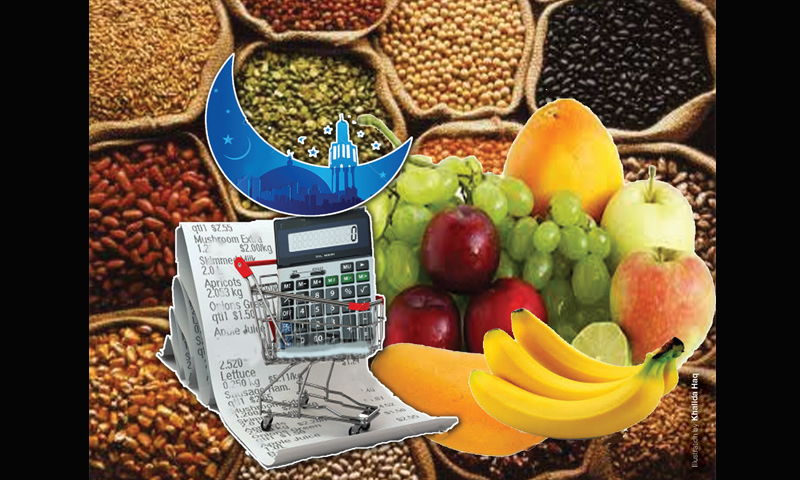Every year, just before and during the holy month of Ramazan, the prices of pulses, fruits and vegetables increase. Half-hearted administrative measures hardly make a difference.
Preventing price flare-ups in times of high demand for food items is possible only if the cost of agricultural inputs is stabilised, crop yields are improved, the output gap is narrowed, production data collection is made more scientific, and processing, storage, transportation and marketing of pulses, fruits and veggies are made efficient.
“Hoarding of pulses begins a few weeks before Ramazan. Absence of cold chains also affect supply of some fruits and vegetables making them pricier during Ramazan,” says an official of Karachi city’s administration.
“All we can do is to convince traders not to indulge in profiteering or conduct raids on retailer shops involved in overcharging. Beyond that things get complicated and need to be addressed at policy making level.”
In most of the meetings held before Ramazan for ensuring price stability, the focus of the city officials remained on securing gentlemanly promise from traders to behave.
The Economic Survey cites ‘unfavourable weather conditions’ as the key reason for the fall in gram output. This is a classic example of how minor crops are being managed in the country
And traders’ representatives try to get the retail prices fixed at the rates they think are justifiable. “That’s how it works every year,” a former commissioner of Karachi told Dawn. “This pattern has become too obsolete, a fresh start is well in order.”
That fresh start ought to be defined and strategised by the provincial governments in consultation with growers, middlemen, wholesalers and retailers and the administration officials. And whereas the final part of that exercise can be initiated a few weeks before Ramazan, major parts of it have to be carried out in phases throughout the year.
Pulses like Gram, Moong, Mash and Masoor see a big rise in demand in Ramazan. But their crop calendars vary and not all provinces produce enough of these pulses for consumption among local population. That’s where provincial officials must coordinate through a common platform. Once they review the anticipated output of these pulses and their available stocks in the market, it may become easier to recommend how the shortfall in any of items can be handled. “If they think imports is the only option so let the government announce a timely and well-spelled out import policy,” suggests an official of Pakistan Commodity Traders Association.
A high-level food price stability committee was established during Benazir Bhutto’s first government in 1988. Traders recall that the committee comprising all stakeholders had been instrumental in stabilising food prices for a couple of years but then its meetings became infrequent and the procedure laid down to ensure food price stability was never adhered to.
Total production of pulses and fruits and vegetables have remained range-bound for the last many years with only slight variations occurring due to occasional rise or fall in the output of one or two items. Besides, in the last decade, volumes export of fruits and vegetables have risen significantly, and the rates of growth in exports have outpaced the rates of growth in production.
Pulses’ production has risen nominally but not to the extent to impact on the price-line when the demand shoots up, like in Ramazan. Clearly, there is a case for bringing more land under cultivation of minor crops and fruits, and there is also a need to enhance their per-acre yields.
During this Ramazan, prices of gram pulse and gram flour recorded sharper increase than is normally seen in Ramazan every year. The reason is: gram pulse output has fallen to 475,000 tonnes from 751,000 tonnes a year ago, according to stats given in Economic Survey of Pakistan.
Interestingly, this decline in output is not due to shrinkage in the area under cultivation which has receded marginally to 975,000 hectares from 992,000 hectares a year ago. The Economic Survey cites ‘unfavourable weather conditions’ as the key reason. This is a classic example of how minor crops are being managed in the country.
After talking to a number of gram pulse growers in Punjab, this writer found that many of them had opted for growing other minor crops instead of gram because when they had produced a historic high crop a year earlier, they were not able to able to get the right price. “Had officials of agriculture department carried out physical surveys, they would have known the actual reason (for lower gram production),” says a Sheikhupura-based producer-cum-exporter.
Production of two other pulses i.e. Masoor and Mash also declined this year by 5.1 and 6.4pc respectively from a year earlier thereby putting pressure on prices in Ramazan. Their local production falls short of domestic demand, heading to regular imports.
Sales of potatoes also expands dramatically in Ramazan as it is used widely in a number of Iftar-special food items. Prices obviously jump up and so they did this year as well.
But here again, a decline in production (according to Economic Survey stats) turns out to be the major cause of the price-hike notwithstanding the controversy about production data and alleged smuggling of the commodity to neighbouring Afghanistan.
Published in Dawn, Economic & Business, July 21st, 2014
















































Dear visitor, the comments section is undergoing an overhaul and will return soon.